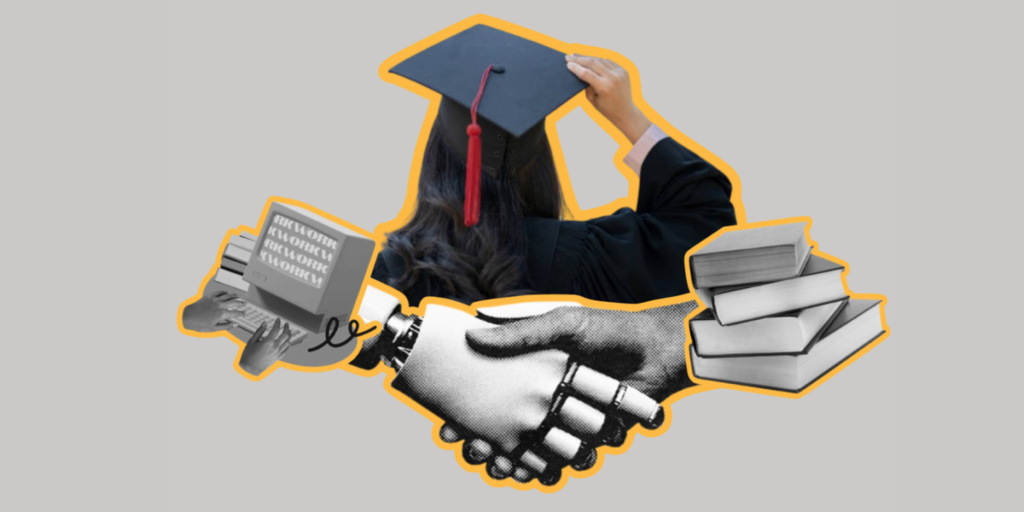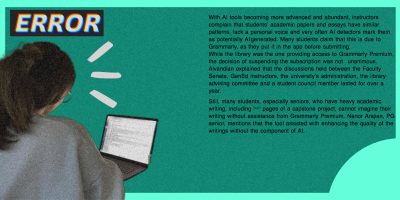
With the tentative use of AI that supposedly makes our lives easier, many freshman students at AUA are struggling to meet the Freshman Seminar program goals and student learning outcomes crucial for their academic and personal development. Students are using AI to write their assignments, stirring debate among faculty members teaching the course about their approaches for addressing this issue.
From self-reflections to narrative essays, students use AI in various ways—some use it to check their grammar while others ask it to write their essays for them. Susanna Ghrjyan, EC freshman, says that she uses the tool to fix grammatical and punctuation mistakes in her papers—a common practice among AUA students, particularly considering that the university provides free access to Grammarly Premium.
Having said this, Arsen Aivazian, another EC freshman currently enrolled in the Freshman Seminar 2 course, reveals the students’ over-reliance on AI tools. “It’s disappointing to see how students utilize AI for literally anything and everything,” he says. Apart from their assignments, he adds that students turn to AI to draft live arguments so that they can present them for debates.
Using AI in the classroom and assignments has caused major frustration and concern among Freshman Seminar instructors, as it shows clear academic dishonesty. Trying to pass AI-created content as your own is is considered a form of plagiarism and cheating, hence violating Article 6.4.2 of AUA’s Student Code of Ethics.
Suzanne Daghlian, General Education advisor and Freshman Seminar lecturer, says, “They are using it as much as they can to get away with their assignments and not realizing that it shows a lack of integrity and commitment to their studies and their development as potential scholars.”
Although AI use among students has been alarming for faculty members, Daghlian says there is no uniform or shared policy for all course instructors. “University-level instructors make their policies,” she adds. “While the Freshman Seminar group does teach the same syllabus with shared policies, the AI policy is not necessarily one of them.” According to her, this is because the 30 instructors don’t share the same approaches; some are more tolerant of AI use, while others strictly prohibit it.
More importantly, this habit hinders students’ learning and development from the very beginning of their experience in an academic environment. Steven Donatelle, another Freshman Seminar instructor, admits that he practices a strict policy when it comes to AI use in class and assignments. This doesn’t surprise me, as I remember his strict policy against technology use in the classroom when I took the course with him as a freshman. “Using AI keeps them from developing the skills that they need to think critically and write,” he says, emphasizing that these are fundamental skills to evaluate their work.
Building on this argument, Daghlian explains that this course is designed for students to discover and develop their voice through writing, which is their only job. For this reason, Freshman Seminar has numerous writing assignments. “We are here to help you become more you and find your voice and skills, putting them to the test,” she adds. “We want students who are willing to take risks and put them on paper.”
Because instructors’ approaches vary in terms of students’ AI use, disincentivizing/punitive measures are also different across Freshman Seminar sections. For example, Ghrjyan says that when they assume that a paper is AI-generated, many Freshman Seminar instructors call their students into their office to ask for clarification on their arguments. “First, they give a warning and let you resubmit but with a grade reduction,” she explains. Of course, there are consequences. “They get a zero on the assignment because that is not their own voice, and in this course, that is what we are assessing,” Daghlian says.
In the case of Freshman Seminar instructors, the techniques for catching AI use vary. Daghlian explains that she encourages all faculty members to get to know their students, notably their voices, by assigning in-class writing assignments without the use of technology. “I make them write every single class and give them a simple prompt to write for 5 minutes,” she says. “You can see who feels confident and can put a sentence together and who can’t.”
Daghlian adds that she can see when students’ papers are AI-generated when they are submitted in a perfectly-written and polished form. Donatelle says he uses different detection tools when he suspects a paper is written by AI. “I can tell when they use AI by comparing their in-class writing assignments with what they submit,” he says. He also detects AI use when students cite their sources incorrectly
Despite the punitive measures, students continue to use AI. “It’s irresistible,” Daghlian says. “They think they won’t get caught because we can’t prove it, and they think that we will give up.”
Donatelle, on the other hand, thinks his students use AI as a shortcut because they believe they don’t have the time to write their papers. He also adds that “They are given a false impression that AI cannot make mistakes and that it’s the way of the future.”
Aivazian says, “We are overloaded and overwhelmed with readings and assignments.” According to him, if the course were less burdensome, students would be less tempted to use AI.
As AI tools are inevitable in education, it’s clear that students and professors are at a crossroads. Students must ask themselves whether relying on shortcuts is worth sacrificing their own voice and skills—the very foundation of their education.
If we want to grow as thinkers and writers, we must resist the temptation of easy solutions and commit to doing the hard, necessary work of learning. The future of our academic integrity—and our ability to think for ourselves—depends on it.












I am very glad to see this article calling for resting the urge to use AI to generate assignments.
I personally agree with Mr Donatelle and think that any AI use must be heavily punished, and it should be the case not only across all FS classes but across the university as a whole. FS classes introduce freshman to academia and carry the heavy burden of forging their view of academia as a whole. And that same attitude should be maintained throughout their academic career at AUA to develop responsibility, which seems to be a very heavy lack among students from what I see. Students will be using AI no matter how light the course load is because any amount of it can be less if you “just use AI”